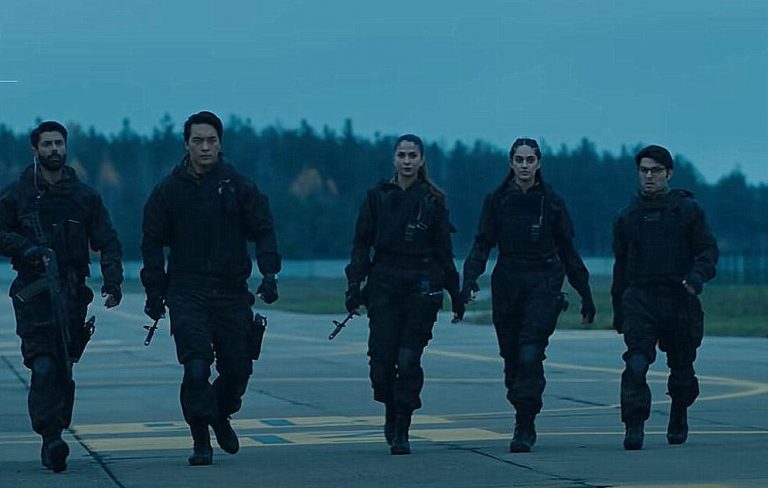The Kashmir Files Analysis: “The only good is knowledge and the only evil is ignorance”, said Socrates. Back during the months of Sept-October last year, Sikhs and Hindus were identified and shot for being who they are in Kashmir. More than 30 years back, the lack of counter-insurgency strategies since the early 70s led to the devastating Exodus of the Kashmiri Pandits. The purpose of these attacks has always been, for the most part, to draw a response from the state. The widespread observation from everywhere suggests that politics of demography, even with the best intentions, end up in a reactionary place. The tragedy of Kashmir has deeply seeded roots. There’s been decades of endless cycles of violence, waves of separatism coupled with the infiltration of Pakistan-funded terror outfits. Multiple governments came in and did too little to actually help out the people residing in the region, leading to simmering discontent amongst the people, even across borders.
It is always difficult to watch films based on a hefty subject matter, even more so when recreating one of the most horrifying incidents in a country’s scarred past. The history of Kashmir is so dense, that not one film could even wholly recreate even an aspect of it. Naturally, I don’t claim to be doing that with this article either. The major thing I kept wondering while going into “The Kashmir Files”, was can a movie faithfully empathize with its subject when its eye was so clearly trained elsewhere?
The film conjures your attention (and sentiments) right from the get-go by opening with the game of cricket to create conflict within an already laid out conflict. Soon, we see a man emptying the bullets looking directly at the screen, almost as if it was supposed to be a metaphor for the propaganda the film was going to shower for the rest of its overlong runtime. Mind you, it wouldn’t have been a problem if the film was solely attacking the government of the time in its mishandling of the situation, which is also clearly did. But there seems to be very conscious defamation of a section of the society done here, almost as if it were an extension of the endless cycles of sell-out news debates that have been raining loud narratives into our living rooms for the past many years. It’s easy for such films to galvanize a sense of national pride through the language of film. That in itself is not something unusual or unconventional for filmmakers to explore and has always formed an essential part of the wider discourse in pop culture. But for that very reason, a deeper understanding played out with a proper context is necessary, or without it, its capacity to enchant (and provoke) continues to grow unchecked.
‘The Kashmir Files’ focuses on multiple characters whose lives were trampled on by the tragedy of 1990, leading to many of them never being able to go back to the valley where their multiple ancestors grew old. Many even died in the squalid camps while some latched onto some glimmer of hope, in the middle of pitiable scanty support from the Indian government. We are introduced to Pushkar Nath, a teacher who is ousted from his Srinagar home after his son is brutally killed. There’s also Krishna (Darshan Kumaar) who comes back to Srinagar, carrying Nath’s ashes. With the help of his grandfather’s closest friends (Mithun Chakraborty, Puneet Issar, Atul Srivastava) he learns lessons that torment him, as he goes through a coming-of-age arc that eventually ‘awakens’ him. He lived his life, strange though this may sound, unaware of the terrible circumstances that his grandfather went through to rescue him out of the region. He comes from a left-leaning university, you all know which one it is and the film doesn’t hold back in telling you of its twisted ideology.
The film has genuine moments where we see flashes of genuine pain in Pushkar Nath, Anupam Kher’s finest role in recent memory. There are two really well-done scenes where the film tugs at your heartstrings, especially one where Nath goes outside the community tent after confronting his family, in order to have a moment in private. The intimate shots poignantly capture the agony and longing in the veteran actor’s eyes, reflecting the quiet pain of millions of Pandits that suffered the displacement. But the film soon reverts back from that handful of moments of nuance, to its uncomfortable and overlong screenplay that’s littered with dialogues that seem so clearly out of a checklist. It’s unfortunate then, that a film based upon such a crucial time in history uses its overwrought screenplay to send out its provocations, rather than thoughtfully pushing the narrative forward through its scarred and emotionally complex characters.
“The Kashmir Files” does another thing quite well, even if that’s in all the wrong ways possible, by assigning certain terms with this divine power in order to undermine them. This is a thing that might go off guard with a lot of viewers, while it validates a lot of people’s existing notions about those terms. But it’s something that should be curiously studied, at least objectively if that’s even possible. When a film of this nature throws in those words, it not only uses them out of context but in doing so also defeats the very purpose of entire movements that our modern society stands on. For instance, notice how in one scene a certain character the movie is cleverly making you root against talks about international publications’ (while actually mentioning them through their respective names!) coverage on key issues concerning the country.
‘The Kashmir Files’ masters the act of oversimplifying some of the most complex and deeply layered political truths that have penetrated through the suffering Indian class for decades. Even from a structural point of view, the movie would’ve worked better if it had focused just on the emotional crackdown of the victims that lie at the center of it. But you cannot separate politics from the personal, can you? The film realizes that and turns that very knowledge against you. There are multiple scenes where the violence gets too difficult to watch, to a point where it doesn’t even seem to be crossing a threshold that dictates what should be shown and what shouldn’t be. It goes overboard in a desperate attempt to solidify all the provocations it always seems to be building upon. When one noted filmmaking keeps relying on gruesome violence to get its message home, it doesn’t make the violence more hard-hitting, only disgustingly loud and uncomfortable.
Also, Read – Sardar Udham [2021] Review: a Slow but Steady Exploration Through the Annals of the Aftermath of the Jallianwala Bagh Massacre
Just because a film oversimplifies a complex event from history by making it seem that it’s either black or white, doesn’t mean that such films shouldn’t be made. It’s always refreshing and culturally important for bold filmmakers to make films on the horrors that minorities (or minorities within the minority) face on a daily basis in the name of religious persecution. But one needs to take into account the context of the events and at what particular period of time these films get released. “The Kashmir Files” would’ve acted as an incredibly essential benchmark film (though it still would be considered as one looking at the box office figures), if it had been released in our rival neighboring country back during the 90s, prompting a glimmer of empathy in the majority there towards the minority. The film opens on a similar hopeful note, reading “For the persecuted minorities of the world”. But it’s a curious exercise to ask the question- can the discourse around a film be mutually exclusive from the film itself? Does it all negate the cinematic framework in which the film tells the story of the Kashmir Exodus? When the political messaging in a film needs to be espoused and shouted (literally) at the audience during regular intervals, it becomes increasingly more important to ask these key questions. And when the discourse around it gets key support and extension from the delegation of the state to stifle or dismiss any of that chatter, it becomes even more important to raise those questions.
Every propaganda film is a result of its time, deserving as much space not only in the sociopolitical sphere it arises out of but also in the cinematic sphere. Saying that one should simply grab a history textbook in order to learn about history rather than relying on a propaganda film (supposedly), is a trivial counterpoint and disrespectful to the creators. Ever since the era of silent films made during the Spanish–American War of the 1890s, propaganda films have always found a place in the cinematic landscape. Most of them are solely made to conflate the idea of history and what people perceive of it.
The very fact that you need to defend your point well against a propaganda movie, that is if the masses even let you speak, goes to show the kind of sociopolitical sphere you tend to live in. Some of the greatest propaganda films consolidate the power of equality while creating a facade of unity. That’s what these movies achieve if you categorize that as an achievement. Hence, every great propaganda film’s reception is based upon its persuasive power over the masses in exposing their naivety and ignorance of getting a better understanding of history, in order to keep up with the larger context that’s always grey.
In his review for “Triumph of the Will”, Roger Ebert wrote- “That Triumph of the Will is a great propaganda film, there is no doubt, and various surveys have named it so. But I doubt that anyone not already a Nazi could be swayed by it. Being a Nazi, to this film, means being a mindless pawn in thrall to the godlike Hitler.” Yet, going through that quote again made me realize how Ebert greatly undermined the need for deciphering why it may be persuasive to people. 87 years later, we’re now living in times where it’s the discourse that forms a narrative for any given subject matter. Such films make a curious case: the role virtue-signaling tends to play around the reception of them.
After all, even IMDB had to change its rating scheme after they noticed “unusual activity” in the movie’s review section. Is it possible to cloak ideology with entertainment and realism when the purpose is “educating” the people with truth from the past? How well do the larger narratives by the media and entertainment industry play squarely into the politics of communalism? While going through these questions in my head, I came across another line Ebert wrote in his review for the great Nazi propaganda film- “Individuality is crushed by the massed conformity.”
Social media has taken out the gravitas of even the most delicate of sentiments, by cheapening them severely every time a new ‘controversial’ thing props out. Rather than carefully understanding what’s causing the toxicity in the first place, the entire rhetoric around any discourse goes around like a bad nursery rhyme. When a key character in ‘The Kashmir Files’ goes from being a naive and misguided ‘liberandu’ to a new-age divine orator, it doesn’t just undermine a section of the society (and the top-ranked universities that shape their intellect) but sheathes an ideological hegemony over the masses. Your disliking of the film may be expressed more as a social pathology, not as a voice against propaganda. At that point, it becomes almost pointless to defend your view of how mourning for victims of persecution should never be selective. In a democracy facing both deep communalism and repression, if the current course always seems to be headed towards disaster, it gets increasingly difficult to believe that there might soon be an end to all the hate-mongering. By constantly reopening the past wounds that’s taken us decades to move over, even when done in the best of intentions, it perforates the delicate capillaries that hold the diverse nature of the country together.
One cannot look at the unfortunate tragedies of the past like a kitchen sink. You need to carefully separate its various parts and unwind it, while not losing touch with your moral compass. Only then can you make sure that it doesn’t get weaponized. All we can hope is for that moral conscience to soon penetrate the broader consensus. Once you lose touch with that, you’re not recalibrating history anymore, just recreating it.






![Sun in the Last Days of the Shogunate [1957] Review – Blending Madcap Comedy and Social Commentary](https://79468c92.delivery.rocketcdn.me/wp-content/uploads/2020/07/Sun-in-the-Last-Days-of-the-Shogunate-1957-768x432.jpg)
![The Elder One (Moothon) [2019]: ‘MAMI’ Review – A constructed drama that escapes challenges but stays relevant](https://79468c92.delivery.rocketcdn.me/wp-content/uploads/2019/11/The-Elder-One-Moothon-768x432.jpg)